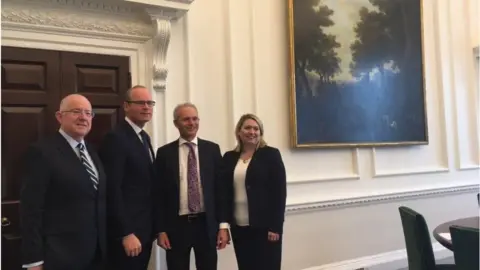British and Irish ministers hold London conference
British and Irish ministers have met in London for a session of their intergovernmental conference.
The body has not been convened for more than a decade.
Its last meeting was in Dundalk, County Louth, in February 2007 - just before the DUP and Sinn Féin confirmed their willingness to share power at Stormont.
But it is now a year and a half on from the collapse of the Stormont power-sharing executive.
Speaking afterwards, the Irish Tánaiste, or Deputy Prime Minister, Simon Coveney, said the conference was "not in any way an attempt by the Irish government to interfere inappropriately in areas that aren't our role in the context of the Good Friday Agreement.
"It is very clear that we do not deal with devolved decision making," he said.
"This is about protecting the institutions of the Good Friday Agreement because there's been an absence of government in Northern Ireland for 19 months now and that's impacting communities in Northern Ireland in negative way."
Structured dialogue
He said the agenda had included legacy issues, security co-operation, political instability in Northern Ireland and east-west co-operation post Brexit.
"British ministers and Irish ministers simply won't be meeting in the future in the same way and as frequently as we have done for more than four decades now and so we have instructed senior officials to come up with definitive proposals on how an Irish government and British government in the future can have structured and interactive dialogue at cabinet level in the same way that France and Germany have, for example.
"This sends a very clear signal that Britain and Ireland are going to remain very close, regardless of the challenges we face."
Asked if the Republic of Ireland would suffer more than the UK in the event of a no-deal Brexit, he said: "I think there's probably too much talk of the negative consequences of a no-deal Brexit.
"Instead, we need to focus on what we do as negotiators. Clearly, for Ireland, a no-deal Brexit is bad and for Britain too.
"I do not think that is a likely scenario and if it were to happen, it would be a failing of politics on a very significant scale."

Analysis, Mark Devenport, BBC News NI political editor
The meeting is a symbol of the failure of the two governments and the Northern Ireland parties to make any progress in their efforts to overcome the political logjam.
Nationalists have been keen to see the intergovernmental conference convened, sometimes portraying it as a forum where important decisions can be made.
Unionists are not fans of the conference, alternately suspicious that it could be used as a vehicle to try to increase Dublin's influence in Northern Ireland's affairs and derisory about what the DUP describes as its "talking shop" consultative role.

For many months, the British government resisted Dublin's official requests for the conference to be convened, with ministers expressing the view that they did not want to do anything to make the situation at Stormont worse.
But eventually they agreed to the Irish request, while at the same time playing down the significance of Wednesday's meeting.
Technically, the conference is only meant to discuss non-devolved issues, although how to define that may be up for debate given the absence of both the Stormont Assembly and Executive.
It is unclear what impact the intergovernmental conference will have on unlocking the stalemate at Stormont.
British and Irish ministers have met many times before to assess how they can move things forward.
It will probably require a real change in the political weather to enable any movement to take place, rather than simply a change in the format and title given to London and Dublin's interactions.

Earlier, the former Northern Ireland first minister, Lord Trimble, accused Dublin of meddling.
But Mr Coveney rejected that claim.
The Northern Ireland Secretary Karen Bradley, Irish Justice Minister Charlie Flanagan and the Cabinet Office Minister David Lidington - who is effectively the Prime Minister's Number Two - attended the conference.
After the formal conference is over, Mr Coveney was expected to hold a separate meeting with the new UK Brexit Secretary Dominic Raab.
